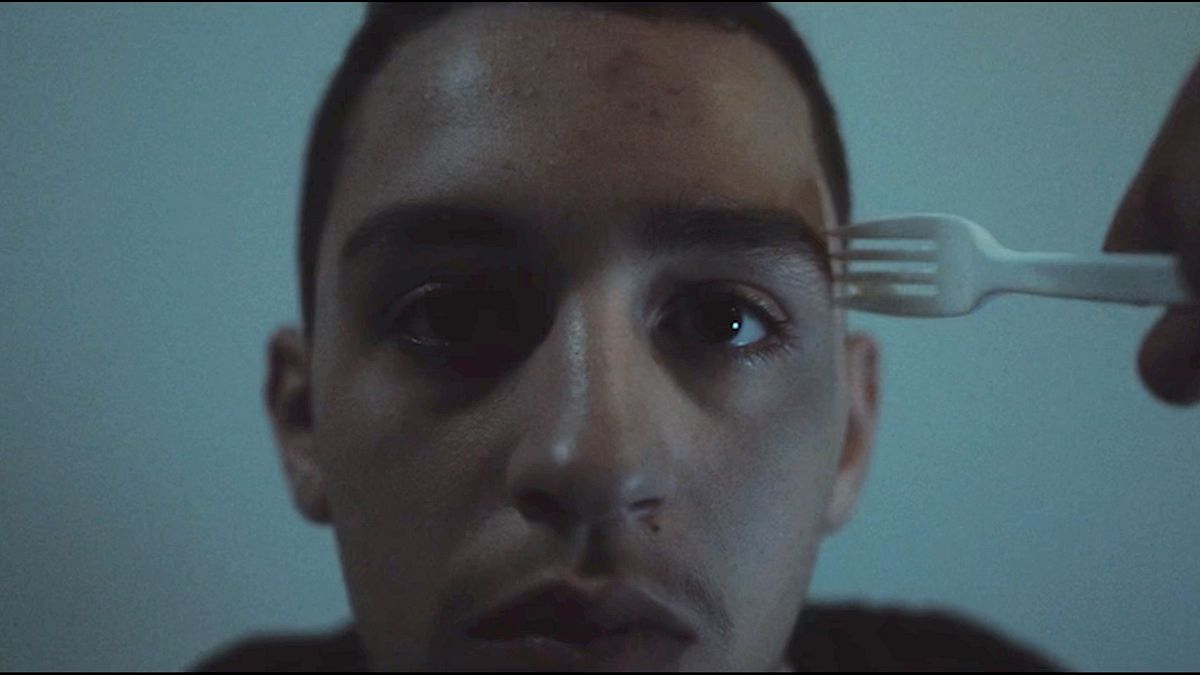Director Noaz Deshe talks to Euronews Culture about his new film ‘Xoftex’ and the challenge of creating an uplifting and unique portrait of the hopes and dreams of the refugees Greece has welcomed since the outbreak of the Syrian civil war.
In an election year in which far-right parties have achieved remarkable successes, largely driven by fear of immigrants and refugees, there is a remarkable new film – Xoftex – describes the plight of asylum seekers not through the usual, grueling despair of social reality, but with humor, fantasy and the occasional zombie.
“Empathy shouldn’t be a bonus, it should be built in,” says film director Noaz Deshe. “It’s not something we even need to mention. It’s a fundamental component of being human. And we’re losing it.” I talk to Deshe about his fantastic new film XoftexWe are on the terrace of the Pupp Hotel, the baroque beauty that inspired Wes Anderson to his Great Budapest hotel.
Deshe’s film was shown last week at Karlovy Vary International Film Festival which takes place every year in July in the Czech spa town. As we speak, Rolls Royces spit out movie stars and producers below us, but we are here to talk about a very different movement of people: the refugee crisis that has hit Greece in the wake of the Syrian civil war.
Xoftex is a refugee camp where detainees wait to learn their fate as asylum seekers. “I changed the name because it’s a real place. It was behind an industrial train station and trains stopped before heading towards the Balkans. Gang activity was widespread and people tried to get on the trains. It was dangerous. There was a burnt-out toilet paper factory.”
The refugee crisis overwhelmed the Greek authorities: “If you visited Greece between 2015 and 2018, the chaos was so great, trying to cope with the huge number of people. You can criticize the government a lot, but how do you deal with this influx? An obscene number of children disappeared. And at Xoftex there was a corruption scandal involving the Minister of Migration and missing funds.”
And despite the manifold horror stories, the refugee purgatory, the grief and the uncertainty, what is remarkable about Deshe’s film is that it refuses to fall into the trap of social realism, which presents relentless misery as the only reality.
“The first night at Xoftex I spent outside with a few people smoking in front of the fence. They were so keen to tell me about their experiences with the asylum system, the problems in the camp, where they came from and which country they wanted to go to. They were so keen to communicate and were so isolated. We went into the camp, huddled together in the Red Cross tent and within five minutes we were telling each other ghost stories. And half an hour later we were filming some kind of weird action film about ghost hunting in the camp. When we looked at the footage, everyone laughed. They asked me: When can we do this again?”
Purgatory Productions
Deshe worked with NGOs and an Italian theatre group called Theatre of the Oppressed: “Suddenly I started coming to the camp a few times a week. One evening we said let’s all make a film trailer and perform it as a play. They were about 10-minute plays. One group wanted to make a gangster film, the other a zombie film. These people had just been waiting and had gone crazy. Because you just sleep with the phone, waiting for a call from the asylum system.”
Deshe even defines the genre of his film as a purgatory film. “You find yourself in a purgatory no man’s land, this dangerous, horrible place where no one cares about you and you are completely dehumanized. You are treated like garbage. This work reminds you that this is not real life.”
The film centers on two brothers, played by former asylum seekers Abdulrahman Diab and Osama Hafiry, who wait for their call and make sketches. Meanwhile, the camp itself begins to melt into fantastic shapes – a sleeping sickness takes hold, the possibility of a remarkable new invention bends time and space. The brothers may argue, but they also joke and laugh.
“The real brothers dreamed of going to Sweden and ended up going there. I filmed them throughout the process. So there is a documentary that is a sister film to this film and will be ready in the next 10 months.”
This is a far cry from the grim misery of social realism: “If you just show the bare reality, you risk victimizing and dehumanizing people because you don’t show their aspirations, their fantasies. You don’t show them being funny, talented, or their potential. The experiment is to create a more intimate space. To drop this documentary reality and take you into the documentation of the dream.”
The film was shot on a very low budget in Germany with the help of House of Cards Creator Beau Willimon and another surprising ally. “We were very lucky in Berlin to meet the head of the counter-terrorism unit of Germany, who was in charge of all the refugee camps. He was very nice. We went to Tempelhof in Berlin. It was a huge camp. And he said that there was a place there where they stored all the houses that were very similar to the ones in Greece. And we could actually use it as a set. It was strikingly similar to Xoftex, and with some movie magic we could make it work.”
Robotics and the extreme right
So let’s return to the present. Marine LePen’s party has increased its parliamentary presence in France; Giorgia Meloni and Victor Orban are in power in Italy and Hungary, and a far-right government party is also in power in the Netherlands. Xenophobia has never been so widespread. How does Deshe see the future?
“We’re at a very dangerous point where we’re no longer reading the news and we’re being guided by an algorithm whose main purpose is to generate hate because it’s fed by our instant gratification mechanisms. These mechanisms are very easy to feed. If the person wants ego gratification, that’s what you’re going to eat on your media diet. If you want love in all its forms, that’s what you’re going to eat. And a lot of people want to hate because they’re angry, so they’re fed in a way that completely undermines the idea of complexity from narratives. If you only consume headlines that fit your narrative, that justify something you can quote very quickly, you become robotized.”
What role do filmmakers play in counteracting this process?
“I see my work as something very simple. You take a flashlight, you go somewhere you feel you need to point it. Sometimes it’s a camera, sometimes it’s a piece of music, whatever you can do, you should do it with the flashlight. In the best case, it’s a film that’s shown at a great festival like this. You won’t feel the impact, but you have to talk about the things that really bother you. You have to talk about Gaza, and you have to talk about what’s happening in Palestine and in Israel and Lebanon and Syria and Ukraine, which are suddenly not in the news so much. And Sudan and Congo. This social movement that’s happening right now… it’s beautiful to see what’s happening. And it’s global.”
Coming back to empathy, we might add that, given the algorithms that promote hate, we need to become empathy machines again.



